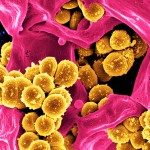Lien vers Pubmed [PMID] – 10487744
EMBO J. 1999 Sep;18(18):4915-25
Integrins play pivotal roles in supporting shear- and mechanical-stress-resistant cell adhesion and migration. These functions require the integrity of the short beta subunit cytoplasmic domains, which contain multiple, highly conserved tyrosine-based endocytic signals, typically found in receptors undergoing regulated, clathrin-dependent endocytosis. We hypothesized that these sequences may control surface integrin dynamics in statically adherent and/or locomoting cells via regulated internalization and polarized recycling of the receptors. By using site-directed mutagenesis and ectopic expression of the alphaL/beta2 integrin in Chinese hamster ovary cells, we found that Y735 in the membrane-proximal YRRF sequence is selectively required for recycling of spontaneously internalized receptors to the cell surface and to growth factor-induced membrane ruffles. Disruption of this motif by non-conservative substitutions has no effect on the receptor’s adhesive function, but diverts internalized integrins from a recycling compartment into a degradative pathway. Conversely, the non-conservative F754A substitution in the membrane-proximal NPLF sequence abrogates ligand-dependent adhesion and spreading without affecting receptor recycling. Both of these mutants display a severe impairment in ligand-supported migration, suggesting the existence in integrin cytoplasmic domains of independent signals regulating apparently unrelated functions that are required to sustain cell migration over specific ligands.
